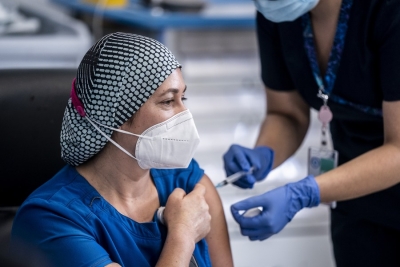FORT WORTH, Texas– As college students return to campus for the fall semester, a majority said they plan to wear masks and take other steps to protect themselves from COVID-19 and help reduce their growing anxiety levels brought on by the pandemic.
With the Delta variant threatening their hopes for a more “normal” semester, most students also said they’re feeling a lot more stress now than they did a year ago, according to new survey results released today by TimelyMD, the leading telehealth company focused on higher education.
“College students typically return to campus refreshed after summer break and instead are feeling exhausted. After everything they’ve been through, many students simply cannot flip a switch to focus on orientation and registration,” said Seli Fakorzi, Director of Mental Health Operations at TimelyMD.
“The survey results mirror what we’re hearing directly from students: they are eager to be back on campus, but they are struggling with the unknown and feeling burned out before classes even begin. Flexibility will be key to retaining them and making sure they are successful,” she said.
Here are key findings from the online survey of more than 1,000 college students conducted last week:
- 70% of students enrolled at institutions that do not have mask mandates in place said they plan to wear a face mask on campus anyway. More than one-third (35%) said they’ll always wear a mask in indoor public spaces. More than 20% said they’ll mask up while they’re in class or in academic buildings (21%). Only one in ten (10%) said they will never wear a mask.
- Students who attend institutions with mask and vaccine mandates overwhelmingly support these protective measures. In both instances, more than 80% are in favor of these requirements (87% for mask mandates and 85% for vaccine mandates). For those whose campuses do not have mandates in place, slightly more than half (55%) said they wish their campuses required masks and/or COVID-19 vaccines.
- Four out of five students (82%) who attend institutions that require COVID-19 shots were already vaccinated or were planning to get vaccinated when their campus put that requirement in place. Fewer than 5% sought an exemption and less than 1% of survey respondents said they submitted a fake vaccine card.
The TimelyMD survey also found that students are growing more stressed and anxious amid a pandemic that shows no sign of abating:
- Three-quarters (77%) of students said the pandemic and the new COVID-19 variants have heightened their levels of emotional distress and anxiety. Six in 10 (60%) are feeling even more stress and anxiety than they did a year ago.
- College students are most concerned about the effect the COVID-19 pandemic will have on their social lives (64%). Other top stress-inducing factors are impacts on physical health (61%), the quality of education (54%), their finances (45%) and their ability to enjoy everything their campus has to offer (40%).
- Nearly three out of four (72%) said they intend to seek some kind of emotional support from friends, family, campus counselors or professional health specialists to help manage stress and anxiety during the academic year.
- Students said the No. 1 thing campuses can do to support their students right now is provide more virtual services focused on their health and well-being, such as telehealth and teletherapy (48%). They also would like to see more remote social support (45%) and increased academic support (41%).
TimelyMD helps college students at more than 100 colleges and universities nationwide by connecting them with medical and/or mental health services 24/7. Through the TimelyCare app on their phone or other device, students can choose from a wide-ranging menu of virtual care options from licensed physicians and counselors in all 50 states — at no cost to them and without the hassle of traditional insurance.
“We know healthy students are engaged students,” said Fakorzi. “Now more than ever, student well-being requires colleges and universities to get creative and stay that way — that’s the ‘new normal.’”


